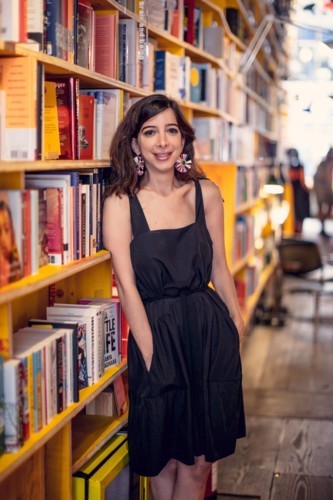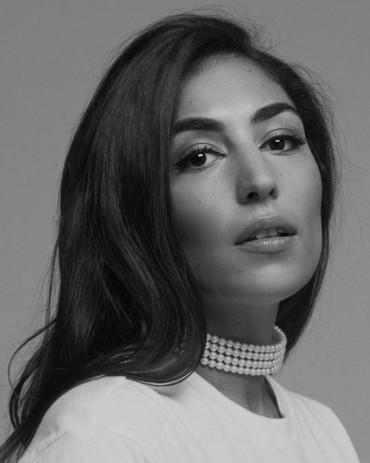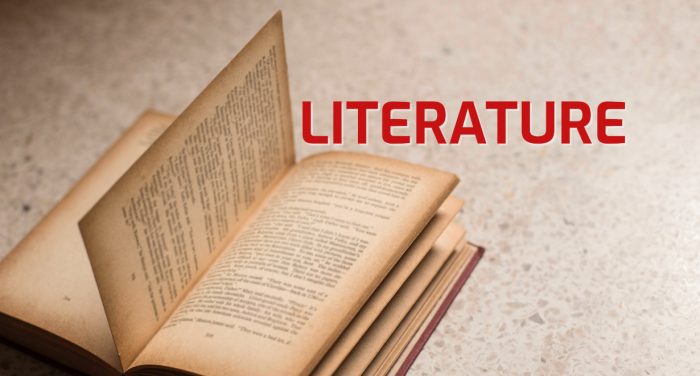After a long wait, we are seeing more Arab women writers. Here, Salma Haidrani speaks to new voices that are changing the way we view the Middle East – and women in particular!
Here we are in the midst of an Arab creative intellectual renaissance. From real-life stories to novels, we are witnessing an increasing number of female writers emerging from the Arab and Middle Eastern heritage who are dominating book shelves around the world, more than ever. Finally, they consolidate their position on the contemporary literary scene.

Take, for example, the notes of the Egyptian-born and resident of London journalist Alia Moreau, The Greater Freedom, which reveal the true meaning of the Middle Eastern woman residing today in the West.
Meanwhile, British-Lebanese journalist Zahra Hanagir released the group Our Women On The Ground: Essays by Arab Women Reporting from the Arab World, which deals with 19 journalist reports from all over the Arab world on topics such as the migration crisis against the backdrop of European right-wing extremist discourse. Dual identities and shifting homelands.
Elsewhere, the collection of short stories, Alligator and Other Stories, was published in the United Kingdom in May this year by Dima Al-Zayat, born in Damascus, born in Damascus. She touched on the topic of the other, displacement, women, and the migrant experience.

It is true that books vary – Morrow’s book is a diary, while Hanakir is an anthology of articles – but all titles commit to presenting an alternative narrative about the region – especially with the main insertion of women.
Alternative narrations
Morrow’s personal experience that led her to experience the feeling of being torn between two different cultures – her roots being Egyptian and brought up in Britain – played a pivotal role in motivating her to write The Greater Freedom. “As I got older the more I started to feel the increasing separation between the two cultures. I wanted to discover what aspects of my life affected this matter and the reasons for it. I wanted women to see themselves and recognize themselves in the text so that they automatically feel that their desires, fears and choices – whatever they are – are correct “.
At the same time, Hankir hoped to present a more comprehensive account of the foreign correspondence. Above all, many of those we associate with this field are for the most part white, western, and male. Up until the time of Our Women on The Ground was released last August, we knew little about Arab and Middle Eastern female journalists who risked their lives to report on conflict boundaries.
“For decades, Western correspondents dominated the international media narrative of the news of the Arab world, as they covered the region for a year or two, then returned to their countries and then wrote about their experiences in diaries or in factual books,” Hankir told Elle magazine, the Arabic edition. And I thought: What about the daring Arab female journalists who have followed their work for years? What if we read about their experiences and how their lives in similar places have been affected? A little less! And she was not wrong. Who else can take us to an Egyptian newsroom dominated by the male element, to a center for immigrants in Germany against the background of hostility to immigrants that is unfolding in most parts of Western Europe, and to a Saudi saleswoman who sells underwear for the first time in the history of the Kingdom? As Hankir says:
Victories
There is no doubt that the work of these writers deserves to be honored, as they have restructured the vision for the region and the women in it. Al-Zayyat, on the other hand, fears that her bold start has failed to correct old paradigms. She says: “I did not intentionally try to create characters that clearly challenge stereotypes. Rather, it was important for me to present Arab and Arab-American personalities who seemed to me as individuals with enough originality and complexity.” Al-Zayyat adds: “Just like all people, they embody a kind of contradiction and sometimes their behavior is difficult to predict, and therefore they do not easily coincide with stereotypes and patterns.”
In return, Moreau welcomes the strides she has made in challenging the paradigms associated with women of Arab and Middle Eastern descent at The Greater Freedom alongside her contemporaries. “It feels powerful! It is a great honor for me to join these wonderful women and I am so grateful that I was able to collaborate with them in writing,” she asserts.
It is a great achievement that required a lot of special effort, and the biggest reason for that is that women in the Middle Eastern heritage – like her – were often absent from the literature that she consumed in her adolescence and in her twenties. “I never found any woman (like me) in the books I read and if that happened, it was often written about her from oriental perspectives, and their own stories were rarely told,” Moreau recalled. And after witnessing the underrepresented societies, such as the African-American community, recalling their stories in huge numbers, while the stories from the Middle East were few, and very few, she added: “I became more and more alert to the remarkable scarcity in the number of novels about Middle Eastern women. – especially in the West – and I felt the urgency to secure an alternative voice.
Moreau’s feelings of frustration repeated. “I am happy that women of Arab and Middle Eastern descent are finally receiving the long-awaited attention they deserve.”
Although Hankir admits that women of Arab and Middle Eastern descent have “done an excellent job over the decades and fought to obtain greater representation in the literary field”, she stresses that “(the late last decade) in particular was a decisive factor for Arab women writers. In this millennium. “
Probably one of the biggest collective victories for writers may be encouraging more authors of Arab and Middle Eastern origins to arm themselves with their pens to write books. According to Hankir: “I think that this unity has had a positive effect that has spread to more women, so they followed the same line to enter the literary arena. Indeed, I received wonderful ideas from some women and I felt unparalleled joy. “
Among the other features of these books that must be considered is that they provide all means of support to help Arab and Middle Eastern women all over the world to navigate comfortably between their identities. Hanakeer focuses on the following: “We have to see what we read as a reflection of ourselves … I grew up in the United Kingdom with my family, who immigrated from Lebanon due to the civil war, and I had a different vision of a young woman when she was in her prime, so I could not see myself. Not at all in those books I’ve read.
As for the most motivating messages that I received from people about the book Our Women on the Ground, they were from Arab journalists full of youth and ambition, and non-white journalists. The book and the testimonies of the women contained in it helped greatly encourage them.
Also, Morrow was pleased with how readers from around the world received her book, The Greater Freedom, and said: “Its repercussions are truly amazing. . Perhaps Morrow’s powerful book motivated the readers to live in a more authentic way: “Many of them tell me that they are now reconsidering how they live this life, how they raise children, or at least in a way that removes them from feelings of shame or guilt rooted in their minds. This is precisely what I aspired to while writing.” .
Challenges
May have to book a tangible impact on the literary scene – at the end of the day, before half a decade, it was rare to see a book of non – whites, in the year 2016 Among the thousands of titles released in the United Kingdom was released less than a hundred books written by British writers of non-white ethnicity. Meanwhile, on the US book bestseller list in the same year, only 30 non-white names appeared out of a total of 500 writers.
Despite these collective successes achieved by female writers, we must not forget that writing these books was not without its challenges. Morrow reveals that she faced “an enormous amount of responsibilities when writing about a society.”
His image in the West, became thorny over the past few decades, especially after the events of 11 September. “When there are few books about marginalized societies, each story is seen as embodying everything or as the end of everything related to this topic or these people,” she says.
Has Morrow also faced challenges that highlight the reality of what some women in the Middle East and the Arab region experience when they remain wary of Orientalist metaphors? In the end, most of what she reveals through The Greater Freedom can be challenging during reading, such as raising expectations from this group of people, whether it is the pressures of motherhood, marriage, or establishing a balance between conflicting cultures. And this is what we should easily consider a global experience. “It can be likened to a tightrope that opens up to the realities of women’s lives in the Middle East – and sometimes the restrictions that go with them – without being in line with the ideas already engraved in the Western mind,” Morrow asserts.
The next decade
Given that these female writers have made real and effective steps to raise the voices of women of Arab and Middle Eastern heritage, what will representation be like in the next decade? While Morrow is confident that from now until the year 2 0 3 0 there will be “a large number of books that reflect an enormous amount of people’s experiences, stories and lives,” she seems less optimistic, considering that the road is still long yet. In her view, progress can only be achieved if the number of women of Arab and Middle Eastern origin working in publishing increases, and together they strive for change: “Currently, we are particularly dependent on alliances.” However, she hopes the representation will be “on a larger and more comprehensive scale than it is today.”
As for Dima Al-Zayyat, it is imperative that we see more writers of Arab and Middle Eastern origin so that this group of people can take it upon themselves to write about themselves instead of being written about by other parties. She says: “What I aspire to, and what I think will happen now, is for more voices to be raised so that no one can claim to be the voice of the Arab experience.”
Continuing commitment to reshaping the vision for the region and honoring women is an integral part of these female writers’ future projects. “I definitely think we have to do more in this regard, and I hope to be able to work on another project that sheds some way on Middle Eastern women, their resilience and their strength,” Hankir says. Morrow is also committed to continuing to share stories related to her community, and she affirms: “I believe that people are hungry for alternative narratives, and this is our responsibility as we are able to do so.”
The Greater Freedom: Life as a Middle Eastern Woman Outside the Stereotypes, by Alia Morrow, is now on the market
Zahra Hanagir has now released the book Our Women on the Ground: Essays by Arab Women Reporting from the Arab World




![The Top & Most Popular Seafood Bucket Restaurants in Dubai for you [Never Miss]](https://uae24x7.com/wp-content/uploads/2020/09/8-seafood-in-a-bucket-scaled-e1600739237403.jpg)
![Procedures for Renewing the Driving License in Abu Dhabi [3 Simple Steps]](https://uae24x7.com/wp-content/uploads/2020/07/Capture-9-e1595666454466.jpg)





